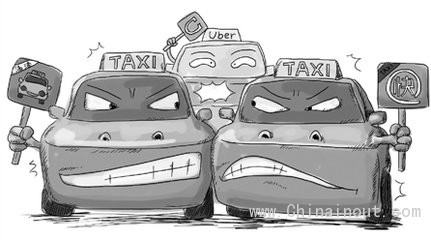
去年12月,从打车应用公司Uber泄露出来的文件显示,全球每周已有80万人次通过Uber进行叫车服务。我们可以肯定地说,这个数字现在又增长了不少。
39岁的连续创业者、快的打车的联合创始人乔李(译音)表示:“这种交通服务在中国很有前途,目标市场非常非常大。”
(浏览全球资讯请关注中国进出口网)
In December, leaked Uber documents showed that the company was completing about 800,000rides a week around the world. It’s a safe bet that the number is much higher now.
No matter how big it has gotten, however, Uber’s ride volume pales in comparison with thenumbers of rides of its main Chinese rival, Kuaidi. That company, little known outside of China,is claiming up to 6 million rides every day. That makes Kuaidi, which is backed by Chinesee-commerce giant Alibaba, or perhaps rival Didi Taxi (which is backed by Tencent Holdings andboasts of a similar scale and footprint), the world’s king of the ride-hailing apps at least bysome measures.
“This kind of transportation service has a big future in China,” says Joe Lee, a 39-year-oldserial entrepreneur who is the co-founder of Kuaidi. “The addressable market is very verybig.”
To be sure, Kuaidi’s model is different from that of Uber. Its app, which counts 100 millionusers, is used mostly to hail taxis in some 300 of China’s notoriously congested cities. Thecompany makes no money from those rides, and the hailing app is nothing more than a tool toacquire customers.
Over time, however, Kuaidi is hoping to monetize its giant customer base with what it calls a“freemium” model. This summer, Kuaidi launched a luxury limo service in 20 cities thatcompetes directly with Uber’s high-end black cars. Eventually, it plans to extend into the kindof ride-sharing, courier and delivery services that appear to be on the sights of mosttransportation startups.
So how did Kuaidi go from zero to 100 million users, and a staggering 1 million drivers, in justtwo years? Lee says China’s characteristics—large, congested cities with poor public transitnetworks and massive fleets of relatively inexpensive taxis—were tailor-made for this kind ofservice.
Subsidies helped too. To expand its network, Kuaidi let customers signal to taxis that theywould add a tip to their fares. That simple feature quickly lured drivers, but it also dramaticallyexpanded the number of riders, as it solved a critical issue: at rush hour and during badweather, demand for taxis exceeds supply in many cities. “We used that simple function tokick-start the whole thing,” Lee says. Since then, Kuaidi added another incentive for drivers.On transactions that go through Alipay, a very popular payment service in China that is builtinto the Kuaidi app, the company will add an additional $1.
Kuaidi, which has raised more than $100 million, now claims 1 million drivers on its network.Didi has also grown its network to similar size by subsidizing rides. The competing subsidieshave led to a ruthless price war that is essentially financed by Kuaidi’s and Didi’s biggestbackers, Alibaba and Tencent.
Uber is entering this market as a clear underdog, a position that CEO Travis Kalanick says herelishes.
“We get to be the little guy,” Kalanick said on Monday during the TechCrunch Disrupttechnology conference in San Francisco. “For me that’s like homecoming.”
Jixun Foo, a partner with GGV Capital, who lives in Shanghai, says Kuaidi and Didi combinedhave cornered the mass market for transportation in China. “In China, the real mass market isnot an Uber black car market,” says Foo, who is an investor in Singapore based GrabTaxi,another cab-hailing firm focused on Southeast Asia. The challenge for the Chinese companies,Foo says, will be to move upmarket with new, paid services that compete with Uber premiumservice. Conversely, Uber will have a hard time gaining mass appeal in China, Foo says.
For now, Uber has done just fine. The company, which began operations there about a yearago, is offering its marquee black car service in six major cities, including Beijing, Shanghai andChengdu. This summer, it launched its less expensive Uber X service, and it began aride-sharing service in Beijing to allow private individuals to pick up passengers.
Allen Penn, who heads Uber’s business in Asia, says that in its first six months in Shanghai,Uber grew faster than it had after launching in New York, Paris or Singapore. Its adoption inBeijing was even faster. “Uber is offering a higher quality standard for a modest premium,”Penn says. “We are seeing growth that is outstripping anything we are seeing around theworld.”
The massive Chinese market seems to have enough room for Uber and its homegrown rivalsfor now. But the companies—with Uber set to expand its offerings and footprint, and the localplayers chasing premium services—are on a collision course in the world’s largest market, andperhaps, beyond. Kuaidi’s Lee says the company has its sights on China first, and neighboringcountries next. Eventually, though, it may seek a foothold in the United States.
For now, the battlefield is in China’s mega-cities wher the price wars are raging. “Ultimately youhave to have a sustainable business,” Kalanick said. “At the end of the day, we are going to tryto offer the cheapest most reliable rides in China. It’s going to be interesting.”









